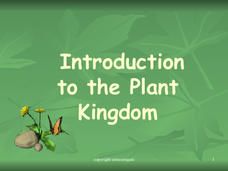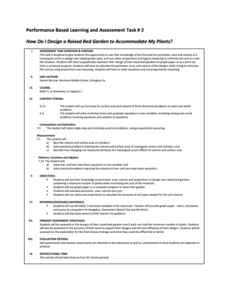Curated OER
Natural Dyes From Plants
Students investigate how natural dyes from plants was an expression of Native American cultures. They examine objects dyed from natural sources, conduct Internet research, and create their own dyes using various plant sources.
Curated OER
Plants, Animals and Our Environment
Students draw and label the basic needs of animals. They draw and label the basic needs of plants. Students understand the basic needs of plants and animals are not only the same, but are interrelated. They know that the environment...
Curated OER
Growing Things - Structure of Plants
In this plant worksheet, students read about plants and growing things from a seed. They then answer the 14 questions on the worksheet. The answers are on the last page.
Curated OER
Introduction To Plants
For this science worksheet, middle schoolers complete a series of puzzles related to the subject of plants. They complete a reading and apply the information to measure reading comprehension.
Curated OER
Plants and Animals In the Local Environment
In this identifying plants and animals in their environment worksheet, students draw pictures of plants or animals that are seen in the air, in water, and on land. Students draw 9 pictures.
Curated OER
Fun with Plants: Seeds Are Scattered in Many Ways
In this seeds instructional activity, students collect 6 different types of seeds and test them to see how they travel. Students list the ways their seeds traveled, name the plants and then draw a picture of each seed. Students...
Curated OER
Plants and Animals: Partners in Pollination
Young scholars describe the complementary relationships between pollinators and the plants they pollinate, identify adaptations that flowers have developed to "encourage" pollination, and create and draw their own "designer" flowers.
Curated OER
Plants and Animals, Partners in Pollination
Students participate in multiple hands-on activities to explore reproduction and pollination. In groups, using a cotton swab and powder, students simulate being pollinators and plants. They name the parts of the flowers and the function...
Curated OER
Plants: Scattering Seeds
Students collect and microscopically examine seeds from the school yard and neighborhood. In small groups, they draw and discuss the shapes of the seeds to determine each plant's method of dispersal. they also test two types of seeds...
Curated OER
Comparing Animals and Plants Venn Diagram
In this comparing 2 items worksheet, students construct a Venn diagram involving the comparison of animals and plants and what they have in common.
Carnegie Mellon University
How Power Plants Work 2
In this second of three lessons on power plants, future engineers find out how we generate electricity and how coal-powered plants operate. They work in small groups to make electromagnet generators to light LED bulbs. A set of...
Scholastic
Study Jams! Plants without Seeds
Non-vascular plants do not develop seeds in order to reproduce. There are also some vascular plants that do not put out seeds. By viewing and reading through these six slides, green thumbs learn about mosses, liverworts, and ferns. They...
University of Wisconsin
Bimodel Botany Bouquet
Gardeners are given an individual plant specimen from a bouquet of local rain garden plants. They group up by their plant type and then make observations together, name the plant, and introduce it to the rest of the class. You then share...
LABScI
Botany: The Plant Dissection Lab
Study everything about plants! The 12-part series of lessons continues with an examination of many aspects of plants. Components of the laboratory activity address the growth and structure of plants by evaluating familiar plants. The...
Biology Junction
Introduction to the Plant Kingdom
Plants provide humans with food, shelter, and medications. Scholars gain a better appreciation for plants after learning their functions, divisions, and early ancestors. Each sub-topic includes slides highlighting vocabulary and...
Allegany-Limestone Central School
Plantae WebQuest
Send your young life scientists on a plant webquest that has them reading case studies to decide if seeds are seeds and plants are plants.
PBS
Plants Count
Changes to habitats mean changes to resources. Groups examine aerial maps to predict areas of low and high plant resources. After formulating a plan, they visit the areas to collect data about the plant resources and then share their...
Curated OER
Let's Learn About Plants!
Take your class on a nature walk around the school and have children assume the role of "Plant Hunter" as they go. The goal is to explore the different parts of a plant. They return to the classroom to discuss the parts that they saw and...
Science Matters
Pre-Assessment: Transport Systems in Animals and Plants
How much do classes know about the transport systems in animals and plants? Find out with a ready-made pre-assessment! The assessment begins by asking individuals to recall related vocabulary and then progresses to questions about...
Radford University
How Do I Design a Raised Bed Garden to Accommodate My Plants?
Give plants the best place to grow. Given constraints on plant spacing, pupils design a raised bed garden using graph paper, then calculate the perimeter, surface area, and volume. They use the provided costs of lumber and soil to...
National Geographic
Plant Life
Looking for a guide to pair with non-fiction concept books? Intended to go with science-based leveled text mentioned in the resource, a unit allows for the study of plant life while enhancing academic vocabulary, language skills, and...
Curated OER
Plants
Sixth graders examine how plants collect water and breathe. In groups, they participate in a variety of activities in which they discover how plants operate in terrariums. To end the instructional activity, they discuss why plants are...
Curated OER
Children's Literature Across the Curriculum Ideas: The Magic School Bus Plants Seeds
Students read The Magic School Bus Plants Seeds by Janna Cole. They complete a variety of cross-curricular activities surrounding the study of plants and seeds. Included are reading, art, math, science, writing, social studies, and...
Curated OER
The Dirt on Plants
Students draw and label the four parts of a plant. They describe changes that are part of the common life cycle. Students follow various one and two step directions. They are asked to discuss that they can recall about plants.
Other popular searches
- Plant Life Cycle
- Parts of Plants
- Plants and Seeds
- Plants and Animals
- Aquatic Plants
- Growing Plants
- Flowering Plants
- Desert Plants
- Edible Plants
- Basic Needs of Plants
- Carnivorous Plants
- Lotus Plants

























